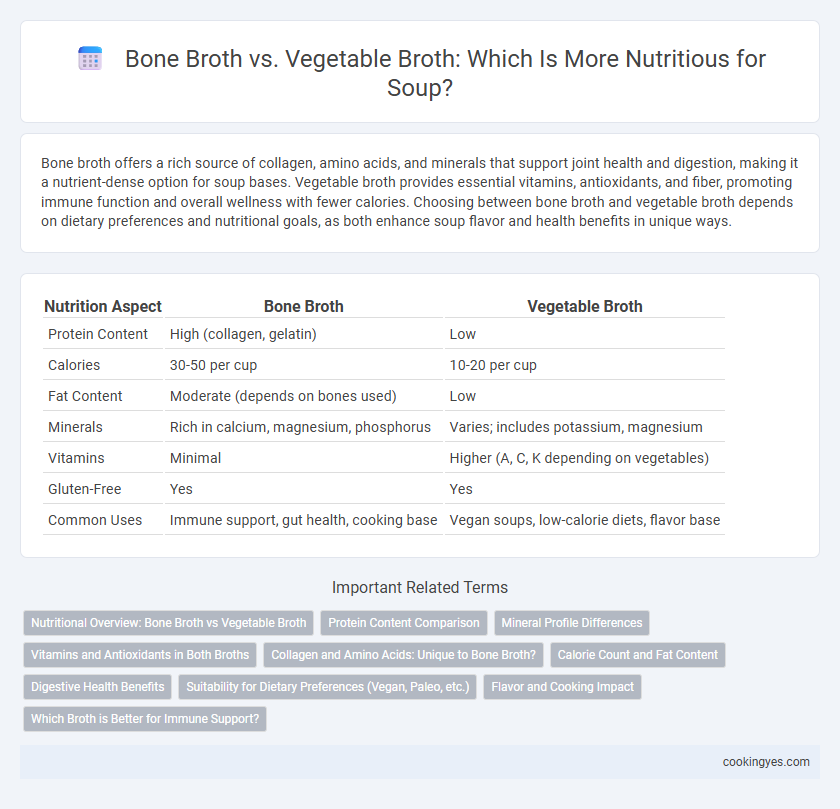Bone broth offers a rich source of collagen, amino acids, and minerals that support joint health and digestion, making it a nutrient-dense option for soup bases. Vegetable broth provides essential vitamins, antioxidants, and fiber, promoting immune function and overall wellness with fewer calories. Choosing between bone broth and vegetable broth depends on dietary preferences and nutritional goals, as both enhance soup flavor and health benefits in unique ways.
Table of Comparison
| Nutrition Aspect | Bone Broth | Vegetable Broth |
|---|---|---|
| Protein Content | High (collagen, gelatin) | Low |
| Calories | 30-50 per cup | 10-20 per cup |
| Fat Content | Moderate (depends on bones used) | Low |
| Minerals | Rich in calcium, magnesium, phosphorus | Varies; includes potassium, magnesium |
| Vitamins | Minimal | Higher (A, C, K depending on vegetables) |
| Gluten-Free | Yes | Yes |
| Common Uses | Immune support, gut health, cooking base | Vegan soups, low-calorie diets, flavor base |
Nutritional Overview: Bone Broth vs Vegetable Broth
Bone broth is rich in collagen, gelatin, amino acids, and minerals like calcium, magnesium, and phosphorus, supporting joint health and digestion. Vegetable broth offers a high concentration of antioxidants, vitamins such as vitamin C and K, and fiber, promoting immune function and gut health. Both broths provide unique nutritional benefits: bone broth excels in protein and mineral content while vegetable broth is typically lower in calories and packed with phytonutrients.
Protein Content Comparison
Bone broth contains significantly higher protein content, averaging 6-10 grams per cup, due to collagen and amino acids extracted from simmered bones. Vegetable broth typically provides less than 1 gram of protein per cup, as it mainly consists of water, vitamins, and minerals from vegetables. For those prioritizing protein intake in soup, bone broth offers a more substantial nutritional benefit compared to vegetable broth.
Mineral Profile Differences
Bone broth offers a richer mineral profile, particularly high in calcium, magnesium, phosphorus, and potassium, due to the prolonged simmering of animal bones and connective tissues. Vegetable broth provides a more varied but generally lower concentration of minerals, with significant amounts of potassium, magnesium, and trace elements depending on the vegetable blend used. The bioavailability of minerals in bone broth tends to be higher, making it a preferred choice for those seeking enhanced bone and joint support through their soup nutrition.
Vitamins and Antioxidants in Both Broths
Bone broth is rich in collagen, amino acids, and minerals like calcium and magnesium, supporting joint health and skin elasticity, while vegetable broth offers a high concentration of vitamins such as vitamin C, vitamin A, and folate, along with a diverse array of antioxidants like flavonoids and carotenoids that help combat oxidative stress. The antioxidants in vegetable broth come from ingredients like carrots, celery, and tomatoes, contributing to immune support and cellular repair. Both broths provide essential nutrients, but vegetable broth tends to have a broader spectrum of vitamins and antioxidants, whereas bone broth excels in protein-derived nutrients and minerals.
Collagen and Amino Acids: Unique to Bone Broth?
Bone broth contains high levels of collagen and essential amino acids such as glycine and proline, which support joint health and skin elasticity, unlike vegetable broth that lacks these compounds. The gelatin derived from simmered bones provides a rich source of bioavailable proteins not found in plant-based broths. Vegetable broth offers vitamins and minerals but does not supply the unique collagen peptides critical for connective tissue repair found exclusively in bone broth.
Calorie Count and Fat Content
Bone broth typically contains higher calories and fat due to the collagen and marrow extracted from simmered bones, averaging about 35-50 calories and 2-3 grams of fat per cup. Vegetable broth is generally lower in calories and fat, often under 15 calories and less than 1 gram of fat per cup, making it a lighter option for soup bases. The protein content in bone broth also contributes to its nutritional density, while vegetable broth offers antioxidants and vitamins without the added fat.
Digestive Health Benefits
Bone broth is rich in collagen, gelatin, and amino acids like glycine, promoting gut lining repair and enhancing digestive health. Vegetable broth provides essential vitamins, fiber, and antioxidants that support gut microbiota and reduce inflammation. Bone broth's nutrients aid intestinal permeability, while vegetable broth offers plant-based compounds beneficial for overall digestive balance.
Suitability for Dietary Preferences (Vegan, Paleo, etc.)
Bone broth offers high protein and collagen ideal for Paleo and Keto diets but is unsuitable for vegans and vegetarians due to its animal origin. Vegetable broth provides a nutrient-rich, low-calorie base perfect for vegan, vegetarian, and plant-based diets, containing vitamins and antioxidants from diverse vegetables. Choosing between bone broth and vegetable broth depends on dietary preferences, with bone broth supporting meat-based diets and vegetable broth catering to plant-focused nutrition.
Flavor and Cooking Impact
Bone broth delivers a rich, umami-packed flavor derived from simmered bones and collagen, enhancing soups with depth and mouthfeel, while vegetable broth provides a lighter, fresher taste with subtle herbal and vegetal notes. The gelatin in bone broth thickens soups naturally, improving texture and adding nutritional benefits like collagen and amino acids. Vegetable broth offers a versatile base with fewer calories and no animal fats, making it ideal for lighter soups or vegetarian diets without compromising aromatic complexity.
Which Broth is Better for Immune Support?
Bone broth is rich in collagen, amino acids, and minerals like calcium and magnesium that support gut health and immune function. Vegetable broth provides antioxidants, vitamins A, C, and K, and phytochemicals that bolster immune defense and reduce inflammation. For stronger immune support, bone broth offers collagen and minerals crucial for tissue repair, while vegetable broth delivers diverse micronutrients and antioxidants essential for overall immune resilience.
Bone Broth vs Vegetable Broth for soup nutrition Infographic

 cookingyes.com
cookingyes.com